- Home
- Iain Pears
The Dream of Scipio Page 2
The Dream of Scipio Read online
Page 2
For inevitable it was, in Manlius’s view. For years now, the barbarians had been moving into Gaul; sometimes they were encouraged, sometimes resisted. Sometimes they were treated as enemies, sometimes as allies against a still worse danger. But every time they took a little bit more, and every time the power of Rome to stop them proved a mirage. Not many years ago, an army of thirty thousand had been sent against Euric’s father: none had come back. His own father had conceived the great strategy of the emperor Majorian to beat back the threat; but was undermined and killed by his enemies among the Roman aristocracy of Gaul even before any army could move. Now here was Sidonius, brave, foppish, foolish Sidonius, who had decided to take a stand where emperors had failed. He had always had a weakness for lost causes, for grand, heroic but empty gestures.
“I had another letter from him begging our help,” Felix continued. “He says that a few thousand troops now could make all the difference.”
“He said that six months ago as well. It made no difference at all. Has something now changed?”
Felix shrugged his shoulders wearily. “We must try, surely? The whole of the civilized world is at stake.”
Manlius smiled. “We are the civilized world, you and I,” he said. “A few dozen people, with our learning. As long as we continue to stroll through my garden arm in arm, civilization will continue. Euric or no Euric. And I fear that you may provoke worse anger than you imagine.”
Felix shook his head. “You would not have spoken so cravenly a few years ago.”
“A few years ago everything was different. When I was young we could travel without fear along well-maintained roads, through well-administered cities, and stay at the villas of friends stocked with labor. There was an emperor who wielded real power rather than being a plaything of warlords. Those days are as distant now as the age of Augustus.”
“It is peaceful enough here.”
“All illusion, my friend. We have been attacked by marauders at this villa three times in the last six weeks. It nearly fell to looters on the last occasion. Two of my other villas have been destroyed and now produce nothing. This tranquil scene you see here this evening depends on six hundred troops hidden in the background. They consume near a third of everything we produce and could turn on us one day. There are fewer people to tend the fields, fewer still to buy our diminishing surplus. In a way, we are under siege here as well, and slowly losing the battle, just as friend Sidonius is losing his. You must know all this from your own experience.”
“I do, of course.” Felix paused, and they walked some more before sitting at the edge of the pond. “And I am grateful to you for inviting me, as ever. I, too, grow lonely for company, even though I am surrounded by people.”
Manlius leaned over and kissed his friend on the cheek. “It is good to see you once more. But however restorative, that is not the sole reason I invited you, of all people. I need to tell you something. Something important.”
It was the moment when he had to test a friendship that had endured for nearly twenty years without argument, without dispute, with perfect amity. Manlius was aware that he was trespassing on something sacred.
Felix turned toward him, drew his arm away. “Such gravity and seriousness! Whatever can it be? You are publishing your letters at last?”
“This is not for laughing. I have been thinking as you have for some time. That we must try. That all we value may indeed be destroyed but it should not be given up so easily. I have received a letter from Bishop Faustus of Riez.”
“Good heavens! You are going to pray! You are going to start going to church! Truly, this man is a saint and a miracle worker. All that I hear about him must be true.”
Manlius grunted, and for a while they talked about the pond they were sitting beside, clogged now with weeds. They swapped aphorisms about water, played with quotations from Pliny about his garden, inverting grammatical constructions so that the neatness and order of the original became the clogged and unkempt reality of the present. Then, as old friends do, they said nothing, but looked at the lilies still growing and the insects hopping across them in the evening light.
“Faustus wrote to ask me to become Bishop of Vaison,” Manlius said eventually.
Felix knew immediately the importance of what he said, but still tried to cover it over with a joke. “Not Bishop of Rome? How about emperor, too? You’d look handsome in the purple. Truly, the man doesn’t know you very well, or he wouldn’t have wasted his ink.”
Manlius threw some dust into the water and watched as the perch swam toward it in the hope of food.
“I have decided to accept,” he said quietly.
TO A SCHOLAR of Julien’s generation, it almost seemed as though there were two Manlius Hippomaneses. On the one hand there was the bishop mentioned occasionally by the chroniclers, the miracle worker whose cult was still vaguely remembered; the man who converted the Jews of Vaison, whose shrine produced miracles long after his death and who protected his people from the depradations of the barbarian invaders. On the other hand, there was the man of letters who existed in the correspondence of his aristocratic friends and in the manuscript of the Dream. One was admired for his piety, the other known for his sophistication and learning, his disdain for the vulgarity of the world, his aloof contempt for the age in which he lived. Julien’s article, the one that brought him to the attention of the authorities in late 1940, sought to reconcile these two.
This he did by arguing, in an essay published as Europe collapsed into war once more, that there was nothing to reconcile. That Manlius’s two reputations were reflections of the same man seen through different perspectives. The bishop who looked after his flock was the same as the aristocrat who wrote dilettante poetry while the rule of Rome in Gaul crumbled into dust. The activist bishop, loved by his people for his good works, was identical to the languid man of literature, so consumed with degenerate idleness that he failed to block the advance of the Gothic Burgundian tribes down the Rhône in the year 475.
For, in Julien’s daringly revisionist view, Manlius’s hidden achievement was titanic, driven by a vision of breathtaking clarity. Because, he explained, Manlius did not fail to block the Burgundians, he deliberately handed over a portion of Provence to them, swapping the nonexistent protection of Rome for the coarser but more effective shield of a barbarian king. Roman Gaul did not fall; it was put out of its misery by the last embodiment of its cultural glory. And because Manlius did this, King Euric’s Visigoths were blocked in their expansion up the river, which would have given them command of the heart of Europe. Manlius, he insisted, saw that the Burgundians would be a powerful protector for the church and ensure its continued communication with Rome long after the last emperor of the West had been deposed. Christendom could not have survived without him; the West would have split between Romans and Arians in religion. The power of the papacy could never have grown. And he ensured that the new rulers governed by law, Roman law transferred into a Burgundian code.
All because Manlius was able to take the imaginative leap to see that Roman civilization was more than Roman rule; he protected the essential while being ready to jettison the appearance. He possessed an intelligence lacking in his peers, for he grasped that the days of the emperors had drawn to a close, but that what it meant could survive, if the ground was well prepared, if the newcomers were taught carefully to guard their inheritance.
Thus an argument that even Julien realized was colored by the somber hues of his own times. He wrote his article and moved on to a more hopeful theme, choosing the literary aspect of Manlius for further investigation, looking at his later influence and slowly focusing on Olivier de Noyen as a key figure in transmitting Manlius’s heritage to the modern age. For the extraordinary clarity of Manlius’s vision had to come from somewhere; something had to make him stand so much higher, think so much more dispassionately, than the others of his generation who, it seemed, scarcely even noticed the end of Rome until fifty years after it had happened.
WITHIN AN hour of his death around the year 486, Manlius’s body was torn to pieces by those who had gathered in the far courtyard to await the event. When it became known he had breathed his last, the crowd—which numbered perhaps two hundred people—surged into the building, demanding to see the corpse. As there were no longer any guards, nor any people capable of resisting such a force, the chamber was soon filled with mourners, singing, praying, and leaning forward to touch the human remains of a man who, everyone knew, was already a saint. It might, perhaps, have been a relic hunter, a type of creature already in existence, who first leaned through the throng to cut off a piece of Manlius’s shroud and take possession of the sanctity residing in a cloth that had touched his mortal flesh. Perhaps it was a townsperson or a neighboring deacon who wanted to possess some part of him to bring glory to his church. Certainly it was not one of his family or friends, all of whom were pushed out of the room by the weight of numbers, or retired in disgust.
The action spread panic and prompted a second, then a third person to pull at the cloth. Within a few minutes the body was naked, but even that was not enough, as men and women alike began tearing at his hair, then his hands. A scuffle, then a fight broke out, and a sort of holy blood-lust developed in the room, with men screaming in rage, and sobbing in ecstasy, departing only when they had a part of him, bloody and jagged, wrapped in their cloaks, or held—still seeping warm, red liquid—in their hands.
What remained when the storm had passed was bathed, redressed, and anointed before being borne on a bier to its last resting place in the church he had so finely decorated in Vaison. Already a mason of the town was planning a shrine, for Manlius’s family was still rich, and would dig deep in their pockets to have the honor of one of its number shown to the world. The deacon (now head of the church until Manlius’s successor could be found) placed the strongest men he could find on guard, then thought more deeply.
Might not the relic hunters come back? They had been known to strip a saint’s house in their ravening hunger for the holy. Besides, Manlius (despite his past) had given himself to the church, yet he was a rich man. Mindful of Our Lord’s injunctions, the deacon did not want his bishop to have died wealthy. Had his death (an apoplectic fit, which came on him suddenly at the age of sixty-two, shortly after he had risen that morning) been more foreseeable, he was sure Manlius would have given instructions that all his wealth be transferred to the church, for its greater glory, and so he might die in proper poverty.
Once the body was secure inside the church, therefore, he gave the orders. By evening the next day, Manlius’s great villa was empty; the gold and silver plate (remarkably little of it, in fact, for the deacon did not realize how often his bishop had paid from his own funds to repair roads and walls and waterways) were locked in the church, the furniture also, the lead and tiles stripped from the roofs to be transferred later. Four of the great stone columns from the colonnade were marked for reuse, when a team of bullocks and cart could be found strong enough to pull the load. The statues were left, but the workers, simple townsmen all, were shocked to see that nearly all were pagan imagery, foul and disgusting displays of impiety. These they toppled from their stands and broke with mallets, lest anyone see and scorn their patron. They were determined to guard his reputation in death as well as he had guarded them in life. It was the very least they could do, for they relied on him to guard them in the after-life as well, and did not wish to risk his anger by neglecting to protect his good name.
Most of Manlius’s great library was burned as well; the old rolls, the newly copied codices alike, were taken into the courtyard and destroyed; an extravagant gesture brought on by haste, for many were on vellum and could have been scraped and used again. The bonfire burned brightly for more than three hours as his precious Ammianus, Tacitus, Ovid, Terence, Plautus went up in the flames so their owner’s purity would burn more brightly to posterity. Also consumed were his treasured Greek texts, his Plato and Aristotle, his two copies of Sophocles, his Xenophon. None were needed, many were scandalous, all should go. Only Christian texts were preserved, winnowed out like wheat from the chaff, lovingly wrapped in cloth and taken back to the church in Vaison, where they rested on a small shelf until, a hundred years later, they were transferred to a monastery outside Marseille.
Here they remained for two centuries until they, in turn, were consumed by fire. By then, however, some had been copied and, just as Manlius’s commentary was preserved by mere chance after his death, mistaken for a Christian text, so it was by accident that, when a copyist came from a new foundation near Montpellier in 723 to acquire sacred works, one of his team of scribes transcribed it as well, writing so fast that he barely noticed what he was jotting down.
There were mistakes, bad mistakes, in this version, but the delicate thread that began before Manlius and stretched across the centuries held still. For though this version was, in its turn, destroyed by Protestants during the wars of religion, by then Olivier de Noyen had seen it and copied down most of it, errors and all. The voice that Julien Barneuve heard, when he picked up the manuscript in the Vatican library, was by then weak and feeble but in the echoing sound, and the chatter of other men’s words and opinions, it was still just recognizable, and through it the words of Sophia, half understood or not understood at all, passed down the centuries into his mind.
The love of letters was an affliction that had seized him when he was young. His father, it is said, was a vain man, made bitter by his own lack of success in the world, for he was a notary in such a small, bedraggled, insignificant town that he knew no fortune would ever come his way. Vaison, so people said, had once been a great city, but so long ago no one really knew whether this was true or not. Certainly, farmers ploughing their fields often turned up huge lumps of stone, carvings, and even metalwork, but far from being interested, they cursed these lumps for the trouble they caused. Only occasionally were some of these salvaged, to be used to build a barn or a house high up on the hill where the inhabitants had retreated a century or so before for safety’s sake.
In this little rabbit warren of dingy, dirty streets, looking out across the river and the fields that covered Manlius’s city, Olivier de Noyen was born in 1322, to the delight of his father, who transferred onto him all his ambitions. Olivier (he believed) was destined for great things. He would become a true lawyer, go to Paris and rise to a position at the court of France itself, that foreign barbaric land to the north where men could become vastly rich and powerful. He conceived this idea almost at the moment he conceived Olivier in a hurried, dispassionate bedding of his wife, and the simultaneous creation of idea and subject struck him so forcibly (when his wife told him the news some fifteen weeks later) that he decided it must be guidance from the saint on the hill, a lady known for the goodness of her advice.
Such heavenly sanction was not to be cast aside, and Olivier was informed of his future career so early in his life that “lawyer” may well have been one of the first words he comprehended. He was sent to the school close by the cathedral, learned his letters and was beaten for his mistakes, then, at night and even on Sundays he was coached by his father for the great career that lay ahead of him after he had been to university in Montpellier. His father had few contacts, but assiduously cultivated those he did have in search of both bride and patron for his son. Through a distant cousin, he felt he had t
he right to correspond with Annibaldus di Ceccani, a monsignor at the papal court in Avignon with a great future before him, for his connections were as powerful as the elder de Noyen’s were weak. By that stage, indeed, his father was beginning to grow alarmed at his son’s demeanor, for the child seemed bent on obstructing his father’s wishes in countless little ways. He would disappear for days, even though he knew the scale of the thrashing he would receive on his return; he deliberately refused to learn; was noisy, constantly asking questions his father—a good, but uneducated man—could not answer. He stole birds, mushrooms, fruit from other men’s land, so much so that complaints were made. More beatings followed, with no result. The letter to Monsignor Ceccani, soon to be cardinal, was an act of desperation as much as anything else, a desire to hand the boy over to a greater authority who might bend, and if necessary break, a spirit too resilient for a father’s will alone.
Why Ceccani agreed in 1336 to take on the fourteen-year-old Olivier that he might work and be surrounded with the sophistication of court life and ecclesiastical learning is not known. Perhaps he simply needed a servant; perhaps, when he met Olivier, he saw a spark in the young boy’s eye that intrigued him; perhaps fortune took a hand, for if Ceccani had not agreed to the request then he would certainly have triumphed in his struggle with Cardinal de Deaux and changed the course of Christendom. Whatever the reason, Olivier shortly afterward packed a small bag, bade farewell to his beloved mother, left Vaison, and went to Avignon, where he remained for the rest of his life, a period in which his father’s aspirations were destroyed.
For Ceccani was a man of some cultivation, and though he never became one of those fascinating, erudite philosopher-cardinals who redeemed the otherwise corrupt church of the next century, he read as widely as was possible in those days and had the beginnings of a library. To this collection of some one hundred fifty manuscripts Olivier was eventually given access. Not that Ceccani initially took a great deal of interest in the boy; he was no teacher and had little human warmth about him. But neglect was exactly what Olivier needed, and he flourished under the new regime. And he fell in love for the first time, the most enduring and consuming passion of his life. He began to read. He arose at four in the morning and read until his duties began; ate his meals quickly so he could run back to the library and read some more, if only for ten minutes at a time; read in the evening with candles stolen from the kitchens until he fell asleep.

 The Dream of Scipio
The Dream of Scipio Stone's Fall
Stone's Fall The Last Judgement
The Last Judgement An Instance of the Fingerpost
An Instance of the Fingerpost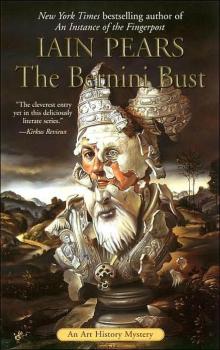 The Bernini Bust
The Bernini Bust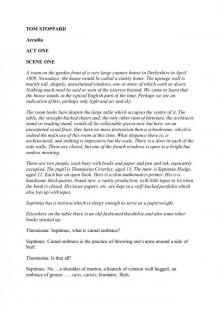 Arcadia
Arcadia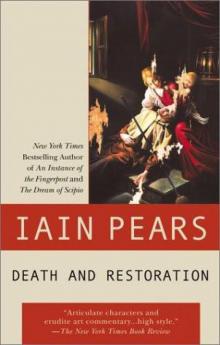 Death and Restoration
Death and Restoration The Raphael Affair
The Raphael Affair The Titian Committee
The Titian Committee The Immaculate Deception
The Immaculate Deception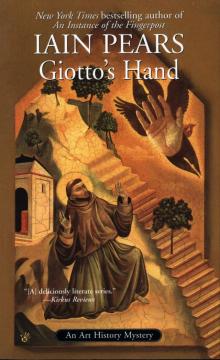 Giotto's hand
Giotto's hand The Portrait
The Portrait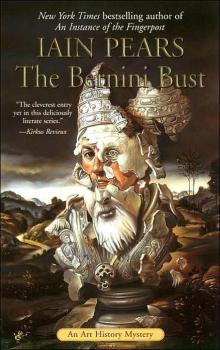 The Bernini Bust ja-3
The Bernini Bust ja-3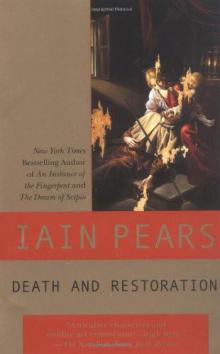 Death & Restoration ja-6
Death & Restoration ja-6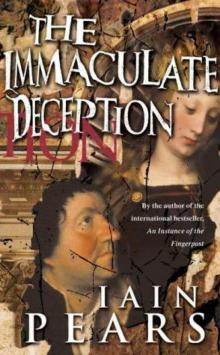 The Immaculate Deception ja-7
The Immaculate Deception ja-7